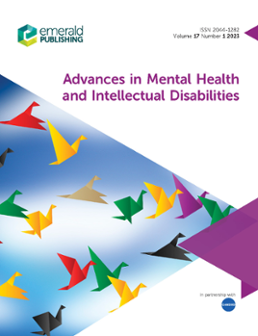Advances in Mental Health and Intellectual Disabilities: Volume 14 Issue 6
Strapline:
formerly Advances in Mental Health and Learning DisabilitiesTable of contents
Troubled beginnings: the adverse childhood experiences and placement histories of a detained adolescent population with developmental disorders
Deborah J. Morris, Elanor Lucy Webb, Emma Parmar, Grace Trundle, Anne McLeanPeople with developmental disorders are significantly more likely to experience adverse childhood experiences (ACEs), although the impact of ACEs on this population is not well…
Flexible assertive community treatment for individuals with mild intellectual disability or borderline intellectual functioning: client variables associated with treatment outcome
Laura Neijmeijer, Hubert Korzilius, Hans Kroon, Henk Nijman, Robert DiddenRecent research on flexible assertive community treatment (FACT) for individuals with mild intellectual disabilities (MID) or borderline intellectual functioning (BIF) has shown…
Facilitating factors for the job placement of workers with intellectual disabilities: supervisors and coworker mentors perspectives
Miquel Àngel Pellicena, Ignasi Ivern, Climent Giné, Olga MúriesThis study aims to contribute to a better understanding of organizational strategies, attitudes and supports that can help people with intellectual disabilities to access…
Developing and evaluating the validity of the behavioural assessment of dysexecutive functioning – intellectual disabilities adaptation (BADS-ID)
Zillah Webb, Karen Dodd, Alexandra Livesey, Sanjay Sunak, Chris Marshall, Lee Harrison, Heather LiddiardAssessment of executive functioning is an important element of a comprehensive assessment of intellectual abilities. Few assessments available are accessible for individuals with…
Dysphagia assessment and intervention: evaluating inclusive approaches using video
Susan Guthrie, Jois StansfieldDysphagia experienced by adults with mental health conditions and/or intellectual disabilities (IDs) has been well-reported. However, accessible and inclusive assessment measures…
The mediating role of positive perceptions on coping strategies and psychological well-being among mothers of children with intellectual disabilities
Simmi Gupta, Aneesh KumarResearch on caregiving has been considering the positive effects experienced by the mothers of children with disabilities. This paper aims to examine whether positive perceptions…
The use of the Montreal Cognitive Assessment (MoCA) to assess cognitive impairment in Prader-Willi syndrome
Johann Chevalère, Virginie Laurier, Maite Tauber, Anna-Malika Camblats, Denise Thuilleaux, Virginie PostalWhen a comprehensive neuropsychological assessment cannot be carried out, a quick and discriminant tool of good psychometric properties can be useful to practitioners. The purpose…
Cognitive behavioural therapy for psychogenic non-epileptic seizures in the context of mild intellectual disability: a case study
Peter Robert Diamond, Claire DelaneyThere is a growing evidence base for cognitive behavioural therapy (CBT) as a treatment for psychogenic non-epileptic seizures (PNES) in the general population. Despite the…
Assessing the effectiveness of the “I Can Feel Good” programme mindfulness module for a group of detained intellectually disabled patients
Rachel Craven, Lyn SheltonThis study aims to evaluate the clinical effectiveness of the Mindfulness module of the “I Can Feel Good” programme, an adapted dialectical behaviour therapy (DBT) informed skills…

ISSN:
2044-1282Renamed from:
Advances in Mental Health and Learning DisabilitiesOnline date, start – end:
2010Copyright Holder:
Emerald Publishing LimitedOpen Access:
hybridEditor:
- Dr Ken Courtenay